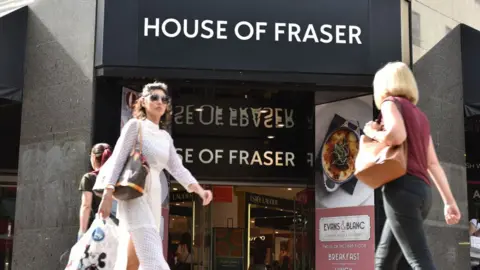House of Fraser store closure plan backed
 Getty Images
Getty ImagesCreditors have backed department store chain House of Fraser's plans to close more than half its stores.
High Street landlords were unhappy with the plan as they will have to shoulder the burden of financial losses, but they were outvoted.
The retailer will now go ahead and shut 31 of its 59 shops nationwide, and also impose huge rent cuts on 10 others that it intends to keep.
Up to 6,000 jobs are set to go as a result of the store closures.
The vote was seen as a make-or-break moment for the 169-year-old business. If the rescue plan had failed, administration was likely.
In all, 2,000 House of Fraser jobs are set to go, along with 4,000 brand and concession roles.
The stores scheduled for closure, which include its flagship London Oxford Street store, will stay open until early 2019, House of Fraser has said.
In May, House of Fraser's Chinese owners, Nanjing Cenbest, reached a conditional agreement to sell a 51% stake to the Chinese owner of Hamley's, C.banner. The sale was conditional on the restructuring plan being approved.
"Following the restructuring, House of Fraser will have a more sustainable cost base and a platform for future growth to deliver an improved customer proposition," the company said in a statement.

The House of Fraser stores identified for closure:
Altrincham • Aylesbury • Birkenhead • Birmingham • Bournemouth • Camberley • Cardiff • Carlisle • Chichester • Cirencester • Cwmbran • Darlington • Doncaster • Edinburgh Frasers • Epsom • Grimsby • High Wycombe • Hull • Leamington Spa • Lincoln • London Oxford Street • London King William Street • Middlesbrough • Milton Keynes • Plymouth • Shrewsbury • Skipton • Swindon • Telford • Wolverhampton • Worcester

'Difficult decision'
House of Fraser is using company voluntary arrangements (CVAs), a form of insolvency proceedings, to overhaul its business.
CVAs are being increasingly used by struggling retailers as a way to close stores, but House of Fraser's has been the most contentious restructuring deal to date.
Landlords argue that CVAs are being abused as a quick way to cut rents and want the government to launch an urgent review into them.
In order to be enacted, CVAs have to be approved by 75% of unsecured creditors, but landlords' voting power is reduced because of the way in which insolvency rules are applied.
House of Fraser chief executive Alex Williamson said: "The CVA proposals have been approved by our creditors and we are grateful for their ongoing support and belief in the future of House of Fraser.
"This was clearly a difficult decision to take but is, ultimately, the only one to secure our future.
"Our focus is on supporting all of our affected colleagues and we are exploring every opportunity available to them, working alongside the Retail Trust and the wider retail community."
Harsh climate
Mark Fry of Begbies Traynor and Charlotte Coates of JLL, who had been advising a group of the affected landlords, said: "It is disappointing that the CVA has been agreed without proper engagement with the landlords, many of whom manage the pensions and investments of the man in the street, despite them having so much at stake through the process.
"However, with landlords' voting power reduced by an arbitrary 75% of the value of their already discounted claims, the odds were always stacked against them.
"The landlords now have a 28-day window to consider whether to make a legal challenge against the process and will be looking at their options closely."
High Street retailers have been facing a harsh climate this year amid falling consumer confidence, rising overheads, the weaker pound and the growth of online shopping.
Electronics chain Maplin and toy chain Toys R Us both collapsed into administration earlier this year.
Other High Street chains such as Mothercare and Carpetright have been forced to close stores in order to survive.
